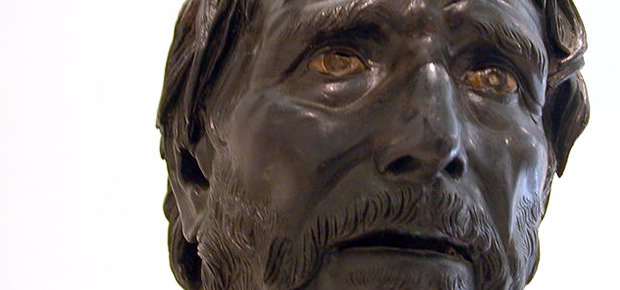
2.3.3 Seneca
Lucius Annaeus Seneca was born in Córdoba between the 4 e l’1 a.C. and died in Rome on the orders of Emperor Nero in 65 d.C. A wealthy family, is brought to Rome by his father, Lucius Annaeus Seneca said the Rhetor, around 5 d.C. After following studies of grammar and rhetoric, has for teachers and philosophers Papirius Fabiano Sozione School of Sestii, and the historic Attalus. The disciples of the Fifth Sestio, founder of the only Roman philosophical school, trasmettonoal young Seneca focused teaching on spiritual exercises and inspired by a strict moral rigor. In common with the Stoa, school Sestio has a keen interest in the philosophy of nature, differing from that for the non-materialistic conception of the soul, to abstain from eating meat and the practice of self-examination evening: all elements that approach the Pythagorean. The accession of Seneca the Stoic sect you have the enthusiasm with which welcomes the lesson Attalus, preferring the practical dimension of ethics and accentuating the ascetic tendencies.
Seneca enters Senate little less than forty. The political career of Seneca is late but rapid and tumultuous. Close to the ruling family under Caligula, in 41 d.C. is exiled to Corsica advent of Claudio, where it will be invoked after eight years with the task of curing the education of the stepson of the same Claudio, Lucio Domizio Enobarbus Nerone. When in 54 d.C. Nero assumed the imperial power, Seneca is in a position to realize the dream that was Plato: influence as a philosopher on the holder of political power. But the initial successes, more due to the young age of Nero and the support of the powerful praetorian prefect Butter, not that the effectiveness of the educational program, were soon frustrated by the desire of the student to assert his exuberant personality. With the death of Burrus, Seneca realizes he has lost all his influence with the student and asked to retire to private life, immersing himself fully in the preparation of his writings. In 64 d.C. year of the Great Fire of Rome, a new request for his resignation turns into a stalemate. Lost the right to depart from Rome, secluded lives in a villa nearby delkl'Urbe. His last years were spent in study and meditation, and when in 65 is overwhelmed by the failure of yet another conspiracy Nero, Seneca is ready to commit suicide, as an extreme gesture of resistance of a Stoic. The last moments of the life of Seneca have been immortalized by a famous page of the Annals of Tacitus. The philosopher is portrayed as bloodless offering libation to Jupiter the Liberator (Jupiter Liberator).
Stoic philosopher Seneca is the first for which we have the writings. Of his vast philosophical production we have received two treaties, Of clementia and De beneficiis, the so-called Dialogues, e le 124 Letters to Lucilius, addition to the seven books of the Natural quaestiones, nine tragedies and operetta political satire.
Lucius Annaeus Seneca, Letters to Lucilius, 108, 12-16:
There is nothing easier than to direct young minds to the love of honesty and justice. Not yet docile and failures, they are won over by truth, if it has found a worthy advocate. I, at least, when I listened Attalus inveigh against the vices, disorders, the evils of life, I often had a sense of pity for mankind and I judged that a teacher be sublime, greater than what is greatest on earth. […] When he began to make the praise of poverty, to show how everything turns on our needs is an unnecessary burden and difficult to move, I wanted to go out often poor school. When beginning to lash the pleasures, to praise continence, moderation in food, purity of soul that not only refrains from illicit pleasures, but also from unnecessary, I was ready to forbid any sin of gluttony and sensuality. Of these lessons, o Lucilio, I have left something. I had set about with great ardor to realize its program; then returned to everyday life, I have kept a few of my good intentions initial. Hence my resignation for life with oysters and mushrooms. There are foods, but serve to whet the appetite, even when you are full. […] Hence my refusal for a lifetime of use perfumes, because the best smell for a human body is not having any. I do not drink no wine nor do warm baths: bake the body and exhaust it with sweats it seemed unnecessary softness.
Tacit, Annals, XV 63-64
[…] Seneca, because his body of old, weakened by little sustenance, did not allow for the rapid flow of blood, do you even open the veins of the legs and knees; prostrated by the terrible suffering, not dare to take his wife with his own suffering and not to lose heart himself to see the sufferings of her, persuaded her to retire in another room. And coming toward less eloquence even in that extreme moment, summoned his slaves and dictated their thoughts that I refrain from play with other form, because they are released with his own words. […] Meanwhile, because the wait was prolonged and death was slow in coming, begged Statius Annaeus, whose long friendship and the art of medicine which had made experiment, to pay him the poison prepared for a long time, the same with which they extinguished in Athens sentences for those convicted of popular. He was gone, but drank it unnecessarily; because he was already cold limbs and body precluded the action of the poison. Lastly, he put it in a tub of hot water, and sprinkling the servants closer, he said again that he offered the libation to Jupiter the Liberator. Finally put in a steam bath, was stifled by the heat, and was cremated without any funeral ceremony. So he prepared a will when, still rich and full of power, already thought to its end.




